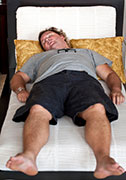Findings may help explain why getting too little sleep might boost diabetes risk
THURSDAY, Feb. 19, 2015 (HealthDay News) — New research helps explain why getting too little sleep might boost diabetes risk. The study was published online Feb. 19 in Diabetologia.
The study included 19 healthy men. They were between the ages of 18 and 30. The volunteers participated in two sleep scenarios. In one, they got a full night’s sleep — about eight hours a night — for four nights. In the other, they only got slightly more than four hours of sleep a night, according to the researchers.
After a few consecutive nights of getting too little sleep, the men’s blood levels of fatty acids increased and stayed high for about five hours in the early morning hours. These levels usually peak and then drop overnight. As long as fatty acid levels remained high, the ability of insulin to regulate blood glucose levels was impaired.
Study lead author Josiane Broussard, Ph.D., explained in a University of Chicago Medical Center news release: “The result was a significant loss of the benefits of insulin. This crucial hormone was less able to do its job. Insulin action in these healthy young men resembled what we typically see in early stages of diabetes.” Broussard is a former graduate student at the University of Chicago, and is now a postdoctoral research scientist at Cedars-Sinai Medical Center’s Diabetes and Obesity Research Institute in Los Angeles.
Full Text
Copyright © 2015 HealthDay. All rights reserved.








